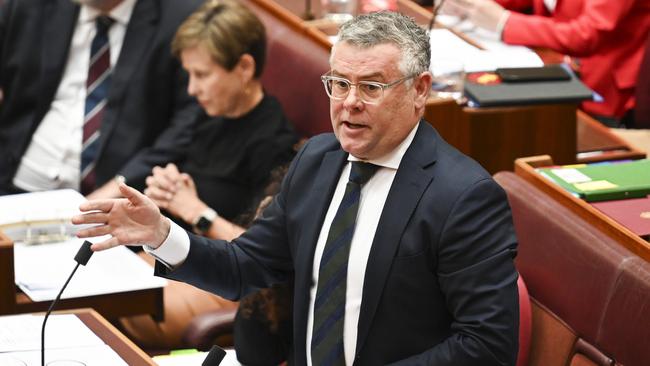Bosses accuse Labor of pre-empting small business review
Workplace Relations Minister Murray Watt has rejected business calls to wind back unfair dismissal rights.

Employers and the Coalition have accused the Albanese government of pre-empting a Fair Work Ombudsman review of the definition of small business, after Workplace Relations Minister Murray Watt opposed business calls to wind back unfair dismissal rights.
Senator Watt rejected a push by the Australian Chamber of Commerce and Industry, subsequently backed by other employer groups, to change the legal definition of a small business employer from 15 to 25 employees.
Senator Watt said there was no evidence the workplace laws were stifling businesses from employing people and the government would not be making it easier for small and medium sized businesses to unfairly sack workers by changing the definition.
Council of Small Business Organisations Australia chief executive Luke Achterstraat said the minister’s stand undermined the FWO probe that was promised as part of the deal with Senate crossbencher David Pocock to pass the second Closing Loopholes bill.
Mr Achterstraat said COSBOA supported increasing the small business definition to 25 employees and it was disappointing Senator Watt had publicly rejected the proposal before the FWO probe was completed.
ACCI chief executive Andrew McKellar said he was surprised the government was not honouring a clear commitment to Senator Pocock to secure passage of the industrial relations bill, and the employer call was not about undermining the rights of workers.
FWO spokeswoman Anna Booth said the review into the definition of small business employers in the Fair Work Act was “ongoing” and there would be consultation with business and unions.
Senator Pocock said his understanding was that while the government was not proposing to make any further changes in this term of parliament, it would consider the FWO review’s findings “in good faith”.
“Complexity with industrial relations is a serious and genuine concern, especially for small business,” he said. “With insolvencies at record highs, and cost of living hurting small business people too, the government needs to step up its support.”
A spokesman for Senator Watt said the minister had made it clear there would be no further industrial relations reform before the election, including the ACCI proposal
“The review by the Fair Work Ombudsman into the appropriateness of the definition of small business in the Fair Work Act is ongoing,” he said. “The government will consider the findings of the review and any recommendations made once it is complete.”
Opposition employment spokesman Michaelia Cash said Senator Watt’s unilateral decision before the FWO had even reported was “making a mockery of the process set up by his government”.
Coalition frontbenchers kept open the possibility of the opposition supporting an expansion of the small business definition to 25 employees, with Senator Cash reiterating the Coalition was “engaging with stakeholders and will announce our policies before the election”.
Australian Industry Group chief executive Innes Willox said the small business definition was “ham-fisted, unsophisticated and outdated”, and he supported lifting the number to 25 employees.
“Any business with 25 employees or less is in reality still a very small business. Very often it is a family business, or a start-up,” Mr Willox said.
“It is ludicrous that many of the current exemptions or special rules for small businesses cut out as soon as an organisation engages the 16th staff member.
“If no change is made we will simply see more small businesses disappear from our communities and fewer Australian businesses take the risk of establishing their own business.”







To join the conversation, please log in. Don't have an account? Register
Join the conversation, you are commenting as Logout